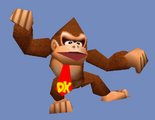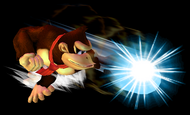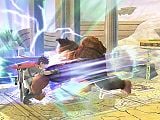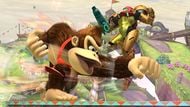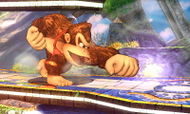Giant Punch
| Giant Punch | |
|---|---|
| File:Donkey Kong Giant Punch.png Giant Punch in Super Smash Bros. Brawl. | |
| User | Donkey Kong |
| Universe | Donkey Kong |
| Article on DK Wiki | Giant Punch |
Giant Punch (ジャイアントパンチ Jaiantopanchi), commonly referred to as the Punch, is Donkey Kong's neutral special move. By pressing the special move button, DK will start swinging his arm around, charging a punch. Pressing the button once more will deliver the blow, which gains knockback and damage for every completed swing. If no button is pressed, after ten swings DK will become fully charged and stop winding up; his head will start smoking to indicate this. The fully charged punch can then be delivered at any time by pressing the special move button; the punch is weaker when used in midair.
If the player presses a shield button or presses the control stick left or right while charging, DK will save whatever charge he has and shield or roll. He can then continue charging later. Being hit while charging will cancel out any charge.
In Super Smash Bros. Brawl, DK gains launch resistance when he throws a fully charged punch, making it very hard to interrupt, and can be saved to defend against an incoming KO move. On the other hand, a punch that's just under full charge has significantly more KO'ing power.
In Super Smash Bros. Melee and Brawl, this move puts Donkey Kong into a helpless state if used in midair. However, it has less ending lag in Brawl, and more invincibility frames.
Reverse Giant Punch
When using Giant Punch in Brawl, if the control stick/D-Pad is quickly hit in the opposite direction during the first few frames, Donkey Kong will turn around very quickly (there is no animation, he simply faces the opposite direction) and will use Giant Punch in the new direction. Every character (with the exception of Sonic and Samus) can do the same with their neutral special as well.
Stages
Giant Punch has stages of being charged, these are recorded in swings of Donkey Kong's arm, each swing DK does increases damage and knockback for the punch, the charge has eleven stages in total, the eleventh stage is the fully charged stage. A fully charged Giant Punch will have a quicker animation resulting in a quicker punch and do the most damage but is weaker in knockback. In Melee and Brawl, all stages of the punch are weaker when used in mid-air.
Smash 64 stages
| Stage | Number of swings | Damage | Percent that can KO | Elbow damage | Elbow percent that can KO |
|---|---|---|---|---|---|
| Stage 1 | 1 | 14% | |||
| Stage 2 | 2 | 16% | |||
| Stage 3 | 3 | 18% | |||
| Stage 4 | 4 | 20% | |||
| Stage 5 | 5 | 22% | |||
| Stage 6 | 6 | 23% | |||
| Stage 7 | 7 | 26% | |||
| Stage 8 | 8 | 28% | |||
| Stage 9 | 9 | 30% | 65% | ||
| Stage 10 | 10 | 32% | 50% | 31% | |
| Stage 11 | 11 | 36% | 48% | 35% |
Brawl stages
| Stage | Number of swings | Damage | Percent that can KO | Elbow damage | Elbow percent that can KO |
|---|---|---|---|---|---|
| Stage 1 | 1 | 10% | 196% | 12% | 162% |
| Stage 2 | 2 | 12% | 165% | 14% | 138% |
| Stage 3 | 3 | 14% | 141% | 16% | 119% |
| Stage 4 | 4 | 16% | 122% | 18% | 104% |
| Stage 5 | 5 | 18% | 106% | 20% | 91% |
| Stage 6 | 6 | 20% | 93% | 22% | 80% |
| Stage 7 | 7 | 22% | 81% | 24% | 70% |
| Stage 8 | 8 | 24% | 71% | 26% | 61% |
| Stage 9 | 9 | 26% | 63% | 28% | 53% |
| Stage 10 | 10 | 28% | 55% | 30% | 46% |
| Stage 11 | 11 | 28% | 81% | 18% | 113% |
| Aerial stage 1 | 1 | 6% | 338% | 8% | |
| Aerial stage 2 | 2 | 8% | 259% | 10% | |
| Aerial stage 3 | 3 | 10% | 215% | 12% | |
| Aerial stage 4 | 4 | 12% | 179% | 14% | |
| Aerial stage 5 | 5 | 14% | 153% | 16% | |
| Aerial stage 6 | 6 | 16% | 131% | 18% | |
| Aerial stage 7 | 7 | 18% | 117% | 20% | |
| Aerial stage 8 | 8 | 20% | 100% | 22% | |
| Aerial stage 9 | 9 | 22% | 89% | 24% | |
| Aerial stage 10 | 10 | 24% | 79% | 26% | |
| Aerial stage 11 | 11 | 25% | 105% | 15% |
- Note, not only does a stage ten Giant Punch have more knockback than a fully charged punch, but stages eight and nine also have more knockback.
- The sweet spot for an uncharged Giant Punch is at the elbow.
Video
Here's a video showing off all the stages of Brawl's Giant Punch.
<youtube>-hebZHzgfsw</youtube>
Customization
Special Move customization was added in Super Smash Bros. 4. These are the variations:
- Lightning Punch: Charges faster and deals electrical damage, but is less powerful overall.
- Storm Punch: Less powerful, but generates a whirlwind that blows opponents away.
Manual descriptions
Melee manual description
"Press File:GCN BButton.png to charge, then again to punch. Press File:GCN LButton.png, File:GCN RButton.png, or File:GCN ZButton.png to stop charging."
Brawl Manual description
"Charge with B, then press again to punch. Quit charging with Z."
Super Smash Bros. for Nintendo 3DS foldout description
"Charge with ![]() , and then press again to punch."
, and then press again to punch."
Gallery
Charging a Giant Punch in Super Smash Bros.
Giant Punch in Melee.
Donkey Kong using the Giant Punch on Ike in Brawl.
Donkey Kong using the Giant Punch on Samus in Super Smash Bros. for Wii U.
Trivia
- In Smash 64, instead of DK's head steaming to show he's fully charged, his fist will spark. He also uses his right arm instead of his left to punch in this game.
- In Melee, the move is stronger if the player doesn't store the charge before using it.
- In the ending of Donkey Kong Country Returns, DK uses a move similiar to this when he is falling, charging his punch and striking the moon.

